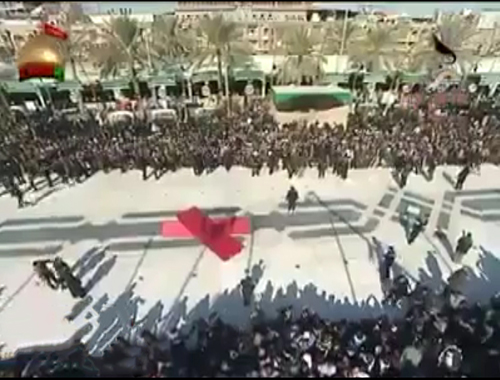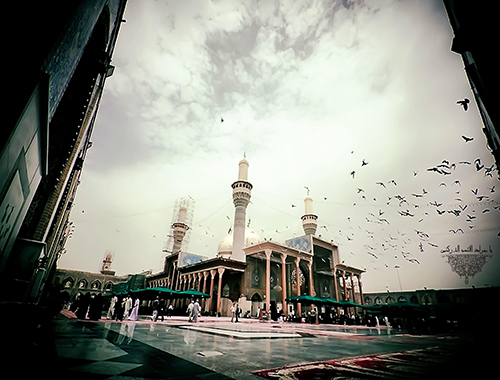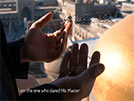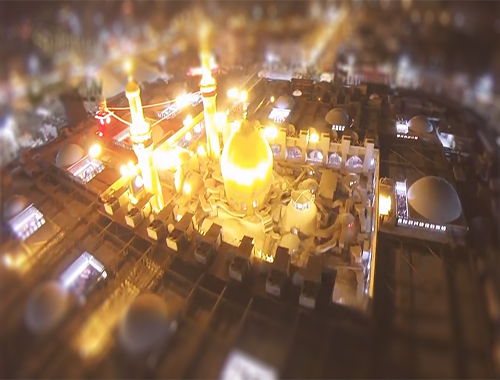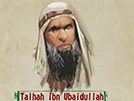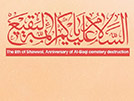Chapter 33-Thirty Third Assembly
- Details
- Hits: 3736
Chapter 33
Thirty Third Assembly
--------------------------------------------------------------------------------
Met on Saturday, 21st of the month of Ramadhan in 409 Hijrah, from what we heard all together. The grand Sheikh al-Mufid Abu Abdillah, Muhammad b. Muhammad b. al-No'man, may Allah protect him said:-
1. Rely on Allah alone
He said: Abul Hasan Ahmad b. Muhammad b. al-Hasan b. al-Walid reported to me from his father, who reported from Muhammad b.al-Hasan al-Saffar, from Ali b. Muhammad al-Qashani, from al-Isfehani, from Sulaiman b. Dawood al-Manqari, from Hafs b. Ghayas, who reported that:
Abu Abdillah Ja'far b. Muhammad, peace be upon him, said: "When any of you prays to Allah with a firm intention to have his prayer answered, then he should (first) despair from all the people, and he should have no hope attached to anyone except Allah, Most High. When Allah finds that in his heart, then there is no prayer from him except that He grants.
And take account of yourselves before your account is taken (on the Day of Reckoning), for on the Day of Resurrection there will be fifty stations, each equal to a thousand years of your reckoning." Then he recited this verse (from Qur'an): '... in a period of day whereof the measure is fifty thousand years.' (70:4)."
2. The meaning of Iman
He said: Abu Bakr, Muhammad b. Umar al-Je'abi reported from Abu Abdillah al-Husain b. Ali al-Maliki, who reported from Abu al-Swalt al-Hirawi, who reported from al-Ridha, Ali b. Musa, peace be upon him, from his father Musa b. Ja'far, peace be upon him, from his father Ja'far b. Muhammad, peace be upon him, from his father Muhammad b. Ali, peace be upon him, from his father Ali b. al-Husain Zainul Abedeen, peace be upon him, from his father al-Husain b. Ali al-Shaheed, peace be upon him, from his father Amirul Mo'mineen Ali b. Abi Talib, peace be upon him, who reported that:
The Prophet, peace be upon him and his progeny, said: "Faith is a statement to be uttered, a deed to be acted upon, and an acknowledgement by intellectual recognition."
Abu al-Swalt said: I related this tradition in a sitting with Ahmad b. Hanbal, and he said: "O Abu Swalt! If this chain of narration were to be read over the insane people, they would recover."
3. The meaning of Islam, Iman and its pillars
He said: Abu Ubaidullah Muhammad b. Imran al-Marzbani reported to me from Ahmad b. Sulaiman al-Tusi, from al-Zubair b. Bakkar, from Abdullah b. Wahab, from al-Suddi, from Abd Khair, from Qubaisah b. Jabir al-Asadi, who said:
A man visited Amirul Mo'mineen Ali b. Abi Talib, peace be upon him, and questioned him about Faith. So, Imam stood up to deliver this address: "Praise to Allah who set the laws of Islam, and made its ways easy for whoever arrived at it, and entrenched its basis against those who came to destroy it. And made it an honour for those who supported it, and a security for those who entered it. He made it a guidance for those who followed it, and an adornment for those who adopted it. He made it a protection for those who sought refuge in it, and a strong rope for those who adhered to it. He made it a proof for those who spoke for it, a light for those who sought to be illuminated by it, a strong witness against those who disputed it, and a victory for those who argued for it.
He made it a (good) knowledge for those who contained it and a (worthy) tradition for those who narrated about it. He made it the (best) basis of judgement for those who adjudged by it, (full of) wisdom for those who experienced, source of intellect for those who pondered, an understanding for those who grasped, certitude for those who recognized, an insight for those who are intent, a sign for those who perceive, an admonition for those who draw lesson, salvation for those who confirmed its truth. He made it a way of divine love for those who reformed (themselves) and a path of proximity (to Allah) for those who expected it, and a place of trust for those who entrusted. He made it a repose for those who handed over the charge of their affairs (to Allah) and a shield for those who endure.
Truth is its way, guidance its (prime) quality, kindness its distinctive feature. It is the most clear path, the towering beacon, the most brilliant light. (Using an equestrian metaphor, he said), It has the highest flag, facile racetrack, an encompassing arena, a contestant for winning the race, and noble horsemen. Confirming the truth is its track, good deeds are its beacons, learning Islam is its light, death is its flag (at the destination), the world is its racetrack, and the Day of Reckoning is its arena; and attaining Paradise its victory, and hellfire its resentment. Taqwa is its implement and people of good deeds are its horsemen.
From Faith, one seeks guidance to good and righteous deeds, and with the righteous deeds, learning of Islam is (truly) maintained. And with the knowledge of Islam, death is dreaded, and with death comes the end of (life in) the world. And it is through this world (life) that one passes over to Resurrection, and it will be with the Resurrection, that Paradise will be brought close to the God-fearing, and justify hell for those who have gone astray.
So Faith is supported by four pillars: Endurance, Certitude, Justice and struggle (in the way of Allah).
And endurance among them is subdivided into four branches: motivation, fear, renunciation and anticipation. Know you that one who is motivated by the yearning for Paradise keeps away from base desires, and one who fears hell abandons the forbidden acts, and one who renounces (by detachment from the) world, finds it easy to face the worldly ordeals, and who anticipates death, hastens to do charitable deeds.
And certitude has four branches: intelligent discernment, wise interpretation, drawing lesson from the events, and (studying) the example of the previous generations. So, he who discerns with intelligence will be able to unravel (the secrets of) wisdom, and he who perceives wisdom understands the tradition (handed down) and for he who understands the tradition, it will be as if he belongs to the past generation.
And justice has four branches: subtle insight, abundant knowledge, being sensibly judicious and drilled in patience. So he who has an insight, deserves the beauty of knowledge, and he who has knowledge, knows the ways of dispensing justice, and he who is judicious, never goes astray. And he who is patient and enduring never neglects his affairs and thus lives among the people highly appreciated.
And struggle (in the way of Allah) has four branches: enjoining good, forbidding evil, being truthful in all situations, and detestation of the impious.
So he who enjoins good, lends strength to the believer, and he who forbids evil earns the scorn of the unbelievers; and he who is truthful in all situations (fearlessly) judges against himself, and he who abhors the impious displays anger for the sake of Allah; and he who displays anger for His sake is a true believer. This is then the definition of Faith and its props."
The questioner rose and said: "You have indeed guided, O Amirul Mo'mineen, and advised. May Allah reward you best on behalf of Islam."
4. Acts which attract quick reward
He said: Abu Ghalib Ahmad b. Muhammad al-Zurari reported to me from his grandfather Muhammad b. Sulaiman, who reported from Muhammad b. Khalid, from Asim b. Hamid, from Abu Ubaidah al-Hazza', who said:
I heard Abu Ja'far Muhammad b. Ali al-Baqir, peace be upon him, reporting that the Prophet, peace be upon him and his progeny, said: "A good act which attracts quickest reward (from Allah) is righteousness, and an evil act which draws close His wrath is to be oppressive. And the worst drawback in a person is that he sees (faults) in others, while he does not see the same in himself, and reproaches others for that which he himself cannot give up, and makes his companions suffer things with which he is not concerned."
5. Prophet's declaration about Ali at Qudaid
He said: Abu Hafs Umar b. Muhammad, commonly known as Ibn al-Zayyat, may Allah bless him with mercy, reported to me from Abu Ali Muhammad b. Hammam al-Iskafi, from Abdullah b. Ja'far al-Himyari, from Abdullah b. Muhammad b. Isa, from his father, from Abdullah b. al-Mughaira, from Ibn Maskan, from Umar b. Zayd, who reported that:
Abu Abdullah Ja'far b. Muhammad, peace be upon him, said: When the Prophet, peace be upon him and his progeny, arrived at the middle of Qudaid (near Makkah), he said to Ali b. Abi Talib, peace be upon him: "O Ali, I prayed to Allah for (a firm bond of) love between me and you, and He granted, and I prayed to Him to establish brotherhood between you and me, and He granted, and I prayed unto him that He make you my successor, and He granted."
A man stood up from the people and remarked: "By Allah, a (small) measure of dates from an old, coarse sack is better than what Muhammad prayed for from his Lord. Why did he not ask for angel to come and help him against his enemy, or a treasure to help him keep away his paucity?" Then Allah revealed this verse: 'Perhaps you feel like giving away some of what has been revealed to you, and your chest is straitened for it, because they say: Why has a treasure not been sent down to him or an angel come down with him? Surely, you are only a warner, and Allah is the Trustee over all things.' (11:12)
6. How Abdul Malik b. Marwan was rebuked
He said: Abu Ja'far Muhammad b. Ali b. al-Husain b. Babawayh, may Allah bless him with mercy, reported to me from Muhammad b. Musa b. al-Mutawakkil, who reported from Ali b. al-Husain al-Sa'dabadi, from Ahmad b. Abu Abdillah al-Barqi, from his father, from Muhammad b. Abu Umair, from more than one of his companions, from Abu Hamza al-Thumali, who reported from one who was present when Abdul Malik b. Marwan rose to address the people in Makkah. When he began the part of admonition during his sermon, a man stood up and said:
"Wait, wait! You are from those who preach, but do not follow, you forbid but do not refrain from what you forbid. You admonish but take no lesson from your admonition. Can your example be emulated? Can your orders be obeyed? If you ask us to follow your example, how can we follow the example of the oppressors? And what is the justification for following the culprits who have usurped the wealth of Allah for their state, and have turned the slaves of Allah as their own slaves? And if you say: 'Obey our orders and accept our advice', how can one advise others when one deceives oneself, and how can obedience to the unjust be obligatory?'
And if you say: 'Take the (words of) wisdom wherever you find them, and accept the admonitions from whoever you hear them', then perhaps there are among us more eloquent in the types of admonitions, and more acquainted with the uses of language than you are. So, remove yourselves from it, open up its locks and leave the way open, so that those whom you have scattered in the country, and transferred them from their abode to several places, may take the charge. By Allah, we did not give you the reins of our affairs, and did not give you authority over ourselves, our wealth and our faith so that you may act in the manner of despots; except that we force ourselves to endure till the time comes, and the end is achieved, and the suffering is over. For everyone of you there is a day he cannot escape and a book of record he must read; a record that does not leave anything small or big without counting it. 'And those who do wrong shall soon come to know what punishment awaits them.' (26:227)."
He said: Then some armed men arrested him. That was the last time we saw him, and we do not know what was meted out to him!
7. Lamentation by Ali at Fatimah's graveside
He said: Abu Ja'far Muhammad b. Ali b. al-Husain reported to me from his father who reported from Ahmad b. Idrees, who reported from Muhammad b. Abd al-Jabbar, from al-Qasim b. Muhammad al-Razi, from Ali b. Muhammad al-Hurmuzani, who reported from Ali b. al-Husain b. Ali, from his father al-Husain, peace be upon them, who said:
When Fatimah, the daughter of the Prophet, peace be upon him and his progeny, fell ill, she willed to Ali b. Abi Talib, may Allah bless him, to withhold the news of her (death) and treat it as a secret; and to allow no one to visit her during her illness. So he did accordingly, attending on her himself, helped by Asma bint Umays, may Allah bless her with mercy, so as to maintain the secrecy as she wished.
Then as her death drew near, she willed that Amirul Mo'mineen, peace be upon him, should attend to her rites, to bury her at night and to efface the trace of her grave. So Amirul Mo'mineen, peace be upon him, arranged accordingly, buried her and concealed the place of her burial. When he dusted off the earth of the grave (from hands), he was so overwhelmed with grief that tears rolled on his cheeks. And then he turned his face towards the grave of the Prophet, peace be upon him and his progeny, and said: "Peace be upon you from me, O messenger of Allah! And peace be upon you from your beloved daughter, the delight of your eye, your visitor, resting in the earth in your locality, for whom Allah so destined that she should join you so soon. O messenger of Allah, it is indeed difficult to forbear the parting of your beloved daughter and my strength has waned with the demise of the lady who was above the women of the world. My main source of solace has been from your tradition (of submission to the will of Allah) and from your own departure which caused to me greater sorrow. For I laid you in the niche of your grave after you breathed your last on my chest, and I interred you with my own hands. And I attended to your rites myself. Yes, and the Book of Allah has the best guide to submission (in the verse): 'To Him we belong and unto Him shall we return.' (2:156).
The trust has been (thus) returned (to you) and the deposit (with me) has been redeemed; and al-Zahra has been snatched away (from me). How ugly has the green and the dusty (i.e. the surrounding) become. O messenger of Allah! As for my sorrow, it is ever lasting, my nights sleepless. The grief cannot leave my heart, till Allah destines for me the same abode as yours where you live. It is the heartache like a festering wound, and the irritating distress. How soon have we been parted from each other? And I raise my complain to Allah!
Your daughter will inform you how your Ummah rallied against me and worked together to usurp her right. So you seek information from her. How much of ill feeling wrestles within her chest for revenge! for which she found no expression. She would say: 'Allah will judge, and He is the Most Just of the Judges.'
Farewell greetings to you O messenger of Allah! Not from weariness or seeking respite. If I go, I do not go because of tiredness, and if I stay on, it is not because of any distrust in what Allah has promised the patient ones. And patience is a blessed and more auspicious option. And had it not been for the prevailing authority against us, I would have found a place by your graveside, and would have lived in seclusion near it, and would have wailed the way a bereaved mother wails over her dead son, over the most distressing calamity.
With Allah as Witness, your daughter is buried in secrecy, her rights usurped forcefully, and her inheritance denied openly. And the time has not been long, nor had you been forgotten. So, the complain is raised to Allah, O messenger of Allah! And to you I offer the most sincere condolence; and the blessing of Allah be upon you and her, and His Mercy and His Grace."
8. Death wipes off the sins
He said: Abu Ja'far Muhammad b. Ali b. al-Husain reported to me from Muhammad b. Ali Majilawayh from his uncle Mohammad b. Abul Qasim, from Ahmad b. Muhammad b. Khalid, from his father, from Muhammad b. Sinan, from Muhammad b. Atiyyah, from Abu Abdillah Ja'far b. Muhammad, peace be upon him, that:
The Prophet, peace be upon him and his progeny, said: "Death is an expiation for the sins of the believers."
9. Your brother is your responsibility
He said: Abul Hasan Ali b. Muhammad al-Katib reported to me from Abul Qasim Yahya b. Zakariyya al-Katanji, who reported from Abu Hashim Dawood b. al-Qasim al-Ja'fari, may Allah bless him with mercy, who said:
I heard al-Ridha Ali b. Musa saying: Once Amirul Mo'mineen, peace be upon him, told Kumail b. Ziyad during his discourse: "Your brother is your religion (his welfare is your religious responsibility) so be cautious of your religion in what you desire (for him)."
And all praise for Allah, the Lord of the Universe. And may Allah bless our master Muhammad and his progeny

